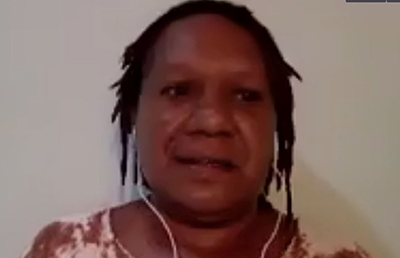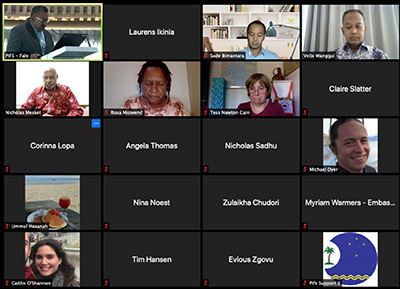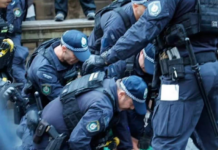
By Laurens Ikinia in Auckland
A Pacific Islands Forum-hosted webinar has called on the United Nations and Indonesia to be “more responsive” to the pleas of West Papuans and take action to resolve human rights issues in the Melanesian region.
The Secretary-General of the Forum, Dame Meg Taylor, the secretary-general of Pacific Council of Churches, Reverend James Bhagwan, diplomats and human rights activists made the call at the Suva-hosted online event on Friday.
“I do want and hope the UN will be responsive and the Indonesian government to also be responsive, so this matter moves forward and [we are] not continually having a conversation about it,” said Dame Meg.
She said that the UN high commissioner for human rights had been invited to visit West Papua, but this was not getting attention.
Dame Meg said that although her term would end next year, the issue of human rights in West Papua would go on as it was “ingrained very hard” for citizens of the region.
The webinar was part of the PIF’s Blue Pacific Talanoa series.
Rosa Moiwend, a West Papuan human rights activist, gave a stimulating message from a strong Melanesian and Pacific woman.
“The lives of West Papuans are a matter for all of us, so we need to take an action to save the lives of West Papuans no matter [what] your political backgrounds, or your standing. I think human lives is the most important thing,” Said Moiwend.
Covid no reason to delay action
Reverend Bhagwan said the covid-19 pandemic should not be a reason to not act on the latest Pacific resolutions about West Papua.
He said the resolutions on West Papua to intervene have been long-standing and “we know that the invitation [to visit West Papua] and the discussions have happened well before covid came into the region”.
“The government of Indonesia [must] allow the fact-finding mission to visit West Papua and to respect the call of Pacific leaders in terms of the Human Rights Commission to send a team and respect those findings,” he said.

“We continue to urge the current chair and we acknowledge the work that their chair and secretary general had been doing and we look forward to discussions around the forum leaders meeting this year.”
“And we continue to call for the incoming chair of the forum to continue PIF leaders’ resolutions and report back to the forum leaders meeting in 2021.”
“We need to open the story, we need access for information – this also includes access for foreign journalists to be able to come in and investigate.”
Indonesia ‘committed’ to human rights’
Indonesian representatives Dr Felix Wanggai and Nicholas Messet said that Indonesia was committed to promoting and protecting human rights.
“Indonesia is also facing its own [problems], but we are committed to promoting and protecting human rights and so alleged human right cases with principle of justice,” said Messet.
He said that human rights violations in West Papua never happened without law enforcement against the perpetrators.
“Not a single human rights issue goes with impunity,” he said.

“Indonesia believes that the PIF is not the forum to discuss the issue of territorial integrity of a sovereign countries, but on the other hand, PIF has a moral duty to see that human right issue must not happen to its members and dialogue partners countries, including Papua and West Papua which is part of Indonesia,” Messet said.
Dr Wanggai highlighted the commitment of the central government of Indonesia to human rights such as basic rights of access to health services, education, connectivity, water, housing for the West Papuan people.
“In the context of Papua, our government has defined the root causes in Papua, for example inequality, undeveloped area, lack of connectivity, and lack of the skill to manage their natural resources.”
Managing special autonomy framework
Indonesia was continuing to manage the special autonomy framework for Papua and West Papua provinces.
“So, by the special autonomy framework, the government recognises Papuan identity in economic, culture, social and local politics,” said Dr Wanggai.
He also highlighted that the government recognised the importance of cultural affairs in solving human rights issues which he called Papuan cultural affairs, known as the Papuan People Assembly (Majelis Rakyat Papua).
However, Reverend Bhagwan said that he was concerned about the arrest of the members of the MRP and the breakup of public hearing meetings across West Papua.
“Here we receive information directly from our member churches and on the ground,” he said.
Last Tuesday, more than 50 people were arrested in Merauke at the meeting to discuss their concern over the special autonomy law,” said Reverend Bhagwan.
Moiwend said that the “invasion” by the Indonesia military in West Papua caused more human rights violations as it often became arrogant and oppressed the Papuans. It scared Papuans in the villages.
Human rights abuse still a problem
She said that human rights abuse still continued.
“But I think one of the key aspects is the political aspect and we can’t deny that there is fighting between the Indonesian military and West Papua freedom fighters. I think when we look at this conflict, ordinary people have became a victim,” she said.
“We have thousands of internally displaced people now living in Wamena and another neighboring regency from Nduga.
“And we haven’t finished working on that issue and now we have Intan Jaya also with the same kind of background. The conflict is also related to the Wabu block which is related to the Freeport mining concession area.
“This needs to be addressed by the government of Indonesia. Two things, one is from the political aspect, and one is from the human rights aspect.
“The most urgent things right now is how the government deals with the human rights issue, especially the situation of women and children as internally displaced people in these two areas, but also in other parts like in Sorong,” Moiwend said.
Laurens Ikinia is a Papuan Masters in Communication Studies student at the Auckland University of Technology who has been studying journalism. He is on an internship with AUT’s Pacific Media Centre.













































The human right abuses by Indonesia military in Melanesia west papua still continuation .Bombadment,torture,Desapear ,Killing,Murderious,Electrocut,food poisoning ,hit and run.So many tactics/method Indonesia militaries intelligent used to “GENOCIDE”in west papua.
Comments are closed.